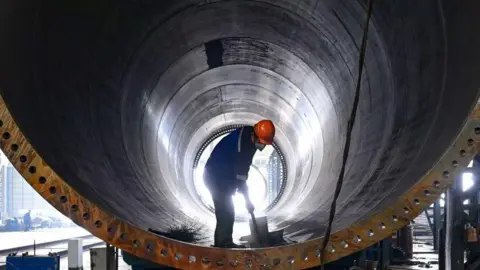 Good pictures
Good picturesChina’s economy expanded in the third quarter at its slowest pace since the start of last year as the country struggles to boost flagging growth.
On an annual basis, gross domestic product (GDP) grew by 4.6% in the three months to the end of September. According to the National Bureau of Statistics of China. This is lower than the previous quarter and below the government’s target of “around 5%” this year.
But it was slightly better than analysts had expected, while other official figures released on Friday, including retail sales and factory output, also beat forecasts.
In recent weeks, Beijing has announced a number of measures aimed at supporting growth.
An official measure of China’s economic growth has fallen short of the 5% target, adding to government concerns.
“The government’s growth target for this year now appears to be in serious jeopardy,” Ishwar Prasad, former head of the International Monetary Fund’s (IMF) China division, told BBC News.
“Achieving the target will take a significant stimulus-fueled boost to growth in the fourth quarter.”
But Moody’s Analytics economist Harry Murphy Cruz was more optimistic. The stimulus measures are “likely to move the economy towards its 5% target for the year,” he said.
“But more is needed if the authorities are to address the structural challenges in the economy.”
Official figures showed new house prices fell at their fastest pace in nearly a decade in September, signaling a worsening downturn in the property sector.
“The property market is unsurprisingly the biggest drag on China’s growth,” said Lin Chang, chief China economist at ING Bank.
“New investment is unlikely to see a significant recovery until prices stabilize and housing inventories decrease…until then there will be a significant negative impact on property growth.”
Earlier on Friday, China’s central bank said it held a meeting to call on banks and other financial institutions to increase lending to support growth.
Last month, the People’s Bank of China (PBOC) announced the country’s biggest stimulus package since the pandemic, including big cuts in interest and mortgage rates.
These programs include support for a flagging stock market and measures to encourage banks to lend more to businesses and individuals.
Since then, the Ministry of Finance and other government agencies have released more programs aimed at boosting economic growth.
The world’s second-largest economy has been plagued by a number of challenges, including an asset crisis, weak consumer and business confidence.